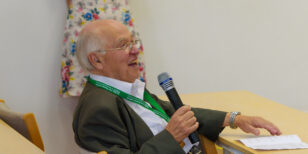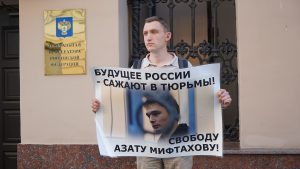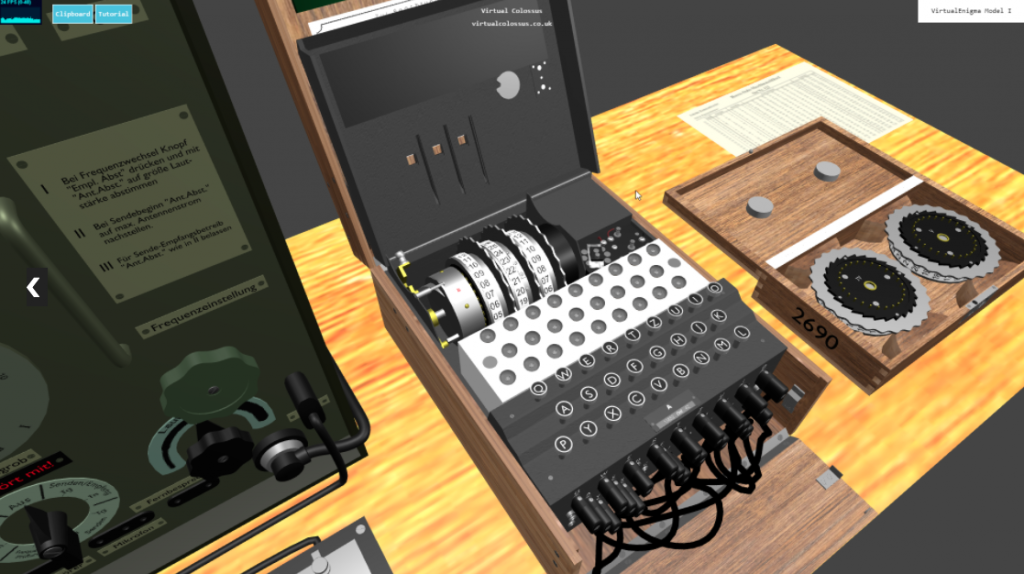Here’s a round-up of some mathematical and maths-related news that happened in March 2025 that we didn’t otherwise cover on the site.
You're reading: Posts Tagged: Bletchley Park
- Fields Medalist Peter Scholze has announced that his Liquid Tensor Experiment, a problem announced six months ago in a blog post that concerns condensed Abelian groups, has now reached the stage where proof assistance software has formally verified the hard part. Exciting! (via Jordan Ellenberg)
- YouTuber and PhD physicist Derek Muller (Veritasium) has recently been involved in a physics-off with UCLA professor Alexander Kusenko, when they disagreed over the explanation behind a physical phenomenon, which escalated to a $10,000 bet over who was right. Long story short, Veritasium won the bet (as covered in this IFLScience news story) and will be using the money to fund a science communication contest. If you’ve got an under-a-minute maths/science video you can post on YouTube or TikTok, you could win a prize of up to $5,000. Props to Derek for encouraging more STEM communication and promoting new talent!
- It’s been formally announced that Neil Sloane is stepping down as president of the OEIS – Russ Cox will take over presidential duties, while Sloane steps down to Chairman of the Board so he can dedicate more time to his writing projects (which we’re assured ‘naturally involve sequences’). Cox has been involved with the OEIS for over 25 years and has been a major contributor to the backend software that makes the site run, so he’s a safe pair of hands to take the project on.
- The eleven 2021 LMS Prize winners were announced at the Society’s Meeting on 2nd July, and the prizes recognise contributions to mathematics in a variety of areas. (via @LondMathSoc)
- Prof. Frank Kelly FRS, Professor of the Mathematics of Systems in the Statistical Laboratory, University of Cambridge and Chair of the Council for the Mathematical Sciences; CBE “for services to Mathematical Sciences”;
- Terry Heard, teacher, author and co-founder of the UK Mathematics Trust; MBE “for services to the Teaching of Mathematics”;
- Jenny Ramsden, teacher; MBE “for services to Further Education and to Mathematics Education through the UK Mathematics Trust”.
Aperiodical News Roundup – June 2021
Here’s a round-up of mathematical things that happened in June, and things you might want to know about that are happening in the future!
News
News In Brief
Alan Turing £50 note launches
On 23rd June the new Alan Turing £50 note was launched, featuring an image of Turing, a quote and various mathematical diagrams. Bletchley Park marked the occasion with a #Turing50Takeover, and the Bank of England has a whole page of info about the new polymer note on their website.
Meanwhile, in Turing-adjacent news, the National Museum of Computing has launched an online Virtual Enigma machine you can use to simulate the device behind the famous Enigma code, along with a video explaining the machine. This joins a host of other virtual historical computers they’ve built, including the Colossus that cracked the code, the Lorenz machine and even ERNIE the random number generator!
Claimed proof of Riemann Hypothesis
Another claimed proof of the Riemann Hypothesis, this time by Kumar Easwaran, emerged this month, and since like all big claims it would need thorough checking before acceptance by the mathematical community, there was some initial skepticism. (This didn’t stop the media from latching on to it as an exciting story though). Since claimed proofs of Riemann are like buses, many mathematicians don’t give them much attention, but Alex Kontorovich took the time to thoroughly debunk this one to save you the trouble.
If you want some actual Riemann Hypothesis news, here’s some: John Baez reports that Alain Connes and Caterina Consani have made some potential progress on part of the problem. In the words of Baez, “my interest is piqued”.
Interesting Links
Thuses is a website for mathematicians to publish and discuss ideas of interest to the mathematical community. It’s described as “a perfect place to share new approaches, slick proofs, and surprising counterexamples. A place for ‘folklore results’ that are considered known but don’t actually exist in literature. A place for everything in math that just has to be shared.” (via Piper H)
The Royal Society has published a set of papers on modelling that shaped the early COVID-19 pandemic response in the UK as a special journal issue that’s free to access.
The BSHM (British Society for the History of Mathematics) has launched the Bibby Awards in the History of Mathematics, for “contributions to the popularization of the history of mathematics in education”. Named after (and funded by the legacy of) the late BSHM member Neil Bibby, up to four awards of £400 can be made each academic year, in return for which holders are expected to give two free talks in schools and produce four digital resources (videos, PDFs or interactives) for the BSHM website. (via Sarah Hart)
Events

The Isaac Newton Institute in Cambridge is hosting The unity of mathematics: A conference in honour of Sir Michael Atiyah which will take place in September 2021 as a hybrid event with a mixture of in-person and virtual talks. The closing date for registration for physical participants is 8th August.
There’s just about still time to register for the People, Places, Practices History of Maths Conference (registration closes 9th July) taking place 12-15 July online (coordinated by the University of St. Andrews). With around 90 speakers contributing, the programme looks packed, and talks will be available to watch ahead, or at the specified time to be followed by a live Q&A.

Alexandre Borovik reports on his blog about Azat Miftakhov day, an event organised online by the Azat Miftakhov committee in solidarity with Azat Miftakhov – a graduate student from Moscow State University who was sentenced to six years in a medium-security penal colony and has already been arbitrarily detained by Russian state authorities for almost two and a half years. Fields medalist Cedric Villani made a speech at the event, and you can watch videos from the event on YouTube.
View D-Day via real-time tweets of Enigma intercepts from Bletchley Park
Bletchley Park are planning to real-time tweet the D-Day landings on their 75th anniversary, via decrypted German Naval Enigma messages intercepted on site.
The Bletchley Park website explains:
To coincide with the 75th anniversary of D-Day, this Thursday 6 June 2019, Bletchley Park will be live tweeting minute by minute, in real time 75 years to the day, decrypted German Naval Enigma messages intercepted on site during the 6 June 1944 operation.
Starting from 23.58 GMT on 5 June, when German naval units were put on alert, to the following night by which time 156,000 Allied troops had landed by sea and air, the messages reveal how the Germans slowly realised that the Allied invasion in the West had begun. The Western Allies had landed in Normandy and not Calais as the Germans had been led to believe.
The 182 messages will be posted on the Bletchley Park twitter account @bletchleypark starting at 00.58 (GMT+1) and ending at 23.38 (GMT+1) – the times they would have originally been intercepted on 6 June 1944.
Update: If you are following the messages, it may be useful to know that Bletchley has produced a glossary of terms used.
Jerry Roberts has died
One of the last surviving Bletchley Park codebreakers, Jerry Roberts, has died aged 93. He was one of a small group of codebreakers who decrypted messages from the German High Command, including the German plans for the battle of Kursk. He initially worked on the Double Playfair hand cipher used by the German police, and later was part of the team working on the (more difficult than the well-known Enigma) Lorenz cipher, which used two sets of five cipher wheels.
Roberts had a successful career after the war in market research, and was a campaigner in later years for greater recognition for his fellow codebreakers – including William Tutte and Tommy Flowers, who had built the Colossus computer which cracked the codes, and Alan Turing, who also apparently did something.
Jerry Roberts obituary – The Guardian
Bletchley Park codebreaker Jerry Roberts dies, aged 93 – BBC News website
Jerry Roberts – Obituary – The Telegraph
Particularly mathematical New Years Honours 2013
The New Year Honours list 2013 was published today. Here we note those awarded in relation to mathematics. Are there any others I’ve missed? Please enlighten us in the comments.
In addition, theoretical particle physicist Prof. Peter Higgs was appointed Companion of Honour “for services to Physics”, Professor Keith Burnett CBE FRS, physicist and Vice-Chancellor of the University of Sheffield was knighted “for services to Science and Higher Education” and Jeremy Buckle, event director of the Big Bang: UK Young Scientists and Engineers Fair, was awarded the Medal of the Order of the British Empire “for services to Science and Engineering”.
A full list may be obtained from the Cabinet Office website.
Update (14:23): Thanks to Mr H in the comments for adding Jerry Roberts, who worked on deciphering Tunny (Lorenz) at Bletchley Park during World War II, awarded MBE “for services to the work of Bletchley Park and to codebreaking” (listed as Raymond Clarke Roberts, in the departmental list, rather than the general).
Update (02/01/2013 12:38): Hetan Shah, Executive Director of the Royal Statistical Society, has tweeted that two RSS fellows not mentioned here are included on the list, that is Prof. Ian Diamond FBA FRSE, Principal and Vice-Chancellor, University of Aberdeen, knighted “for services to Social Science and Higher Education”, and Prof. David Hand, Senior Research Investigator, Imperial College London, awarded OBE “for services to Research and Innovation”.
Foreign Office gives Bletchley Park £480,000 and announces GCHQ apprenticeships

Having neglected the home of wartime codebreaking since it packed up and left with the end of hostilities, it looks like the Foreign Office is Turing over a new leaf – Foreign Secretary William Hague paid a visit to Bletchley Park on Thursday to make a couple of announcements that will please both amateur and more serious codebreakers.
The Bletchley Circle: codebreaking thriller on ITV1
ITV will show a new period drama called The Bletchley Circle from Thursday 6th September at 9pm on ITV1. According to the Milton Keynes Citizen, the story “follows the lives of four fictional women whose brilliant work at Bletchley Park during WWII helped to smash codes used by the German military.”
Susan, Millie, Lucy and Jean are back living normal lives, but behind Susan’s conventional exterior as a 1950s housewife and mother is a steely determination that really shouldn’t be under-estimated.
The unresolved murders of Jane Hart and Patricia Oakes bring Susan’s detective skills to the fore once more, and armed with handwritten charts of numbers, dates and times, she spots a pattern of behaviour that no-one else has seen…
The Milton Keynes Citizen quotes Laura Mackie, part of the ITV Drama Commissioning team, saying “The Bletchley Circle combines a vivid portrait of post-war Britain with a taut and original codebreaking thriller”. Here’s a very short trailer for the show:
Source: More drama at Bletchley Park! – Milton Keynes Citizen.
More info: The Bletchley Circle on ITV.com

